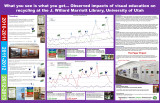1 - 100 of 6
| Creator | Title | Description | Subject | Date | ||
|---|---|---|---|---|---|---|
| 1 |
 |
Miller, Jan D. | Effect of ink types and printing processes on flotation deinking | Examination of ink types reveals that newsprint oil-based offset-cold and offset-heat inks contain substantial oil (45 to 60%) and resin (5 to 35%), water-based ink contains water (40%) and resin (polystyrene, 30%). These inks are liquids with densities around 1 g/cm3, having various viscosities... | Toners; Inks; Photocopying; Laser printing; Flotation; Deinking; Recycling; Office waste; Hyrdophobicity | 1997 |
| 2 |
 |
Miller, Jan D.; Hupka, Jan | Potential of air-sparged hydrocyclone flotation in environmental technology | Air-sparged hydrocyclone (ASH) flotation is a high capacity flotation technology originally developed in the Department of Metallurgical Engineering at the University of Utah for processing mineral resources. However, the technology has been found to be useful in industrial waste processing, recycli... | De-inking; Capacity; Recycling | 1992 |
| 3 |
 |
Werner, Carol M. | Teaching the concept of precycling: a campaign and evaluation | ABSTRACT: Precycling, or purchasing wisely to reduce waste, is the EPA-preferred way to conserve resources and extend landfill life. A 3-month campaign of radio, television, and in-store advertising was effective at teaching the concept of precycling. After the campaign, telephone interviews indicat... | Recycling; EPA; Waste management | 1996 |
| 4 |
 |
Miller, Jan D. | Thermogravimetric/Mass spectrometric (TG/MS) characterization of toner particles from photocopied wastepaper and the impact of these features on flotation deinking | Flotation deinking of photocopies from office waste is known to be much more difficult than the flotation deinking of newsprint. In this regard, research has been undertaken to better understand the phenomena which account for the poor efficiency in the flotation deinking of such office waste. Durin... | Photocopied paper; Recycling; Deinking; Flotation; Thermal decomposition; Thermogravimetry; Mass spectrometry; Differential scanning calorimeter; Toner particles | 1995 |
| 5 |
 |
White, Paul H. | Validation, persuasion and recycling: capitalizing on the social ecology of newspaper use. | Two experiments used clinical validation to increase scrutiny of messages posted in public settings. The first experiment used a 2 (validation: no/yes) × 2 (persuasion: none/"it is important") factorial design to develop messages about newspaper recycling. The prompt (no validation/no persuasion) h... | Recycling; Social Ecology; Newspapers; Social psychology | 2004-09 |
| 6 |
 |
Nichols, Karren E. | What you see is what you get... Observed impacts of visual education on recycling at the J. Willard Marriott Library, University of Utah | This poster looks at a three year timeline of educational exhibits, visual cues, and reminders, focusing on changing behaviors, encouraging people to recycle and reduce consumption, and observed impacts on the quantities of paper, aluminum, and plastics #1 and #2 being collected in the library. | Recycling; Sustainability; Water bottles; Paper recycling; Duplex printing; Visual education; Green; Exhibits; Trash; Waste reduction; Print alternatives | 2014 |
1 - 100 of 6
